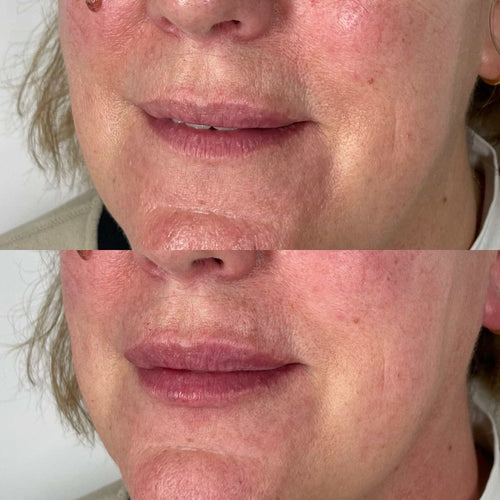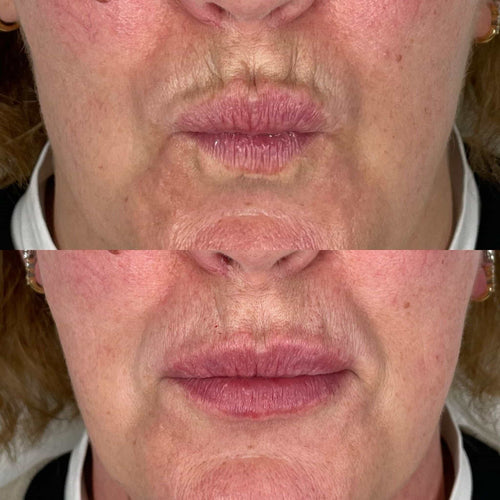Schedule a Dermal Filler Session with Dr. Laura Geige Now
Factors to Consider
Cosmetic Procedure Disclosure
Deciding whether to disclose cosmetic procedures like lip fillers to your dentist is a personal decision with both potential benefits and drawbacks. Here’s a breakdown of factors to consider:
**Factors to Consider:**
-
Type of dental procedure: Certain procedures, such as dental implant placement or oral surgery, may be directly affected by fillers.
-
Location of fillers: Fillers placed close to the areas being treated by the dentist (e.g., lips during a tooth extraction) could increase the risk of complications or affect anesthetic effectiveness.
-
Composition of fillers: Some fillers are more likely to cause adverse reactions when combined with certain dental materials or procedures.
**Benefits of Disclosure:**
*
Enables the dentist to provide safer and more effective treatment.
*
Minimizes the risk of complications arising from undisclosed fillers.
*
Allows for informed consent regarding potential interactions or adjustments to the procedure.
**Drawbacks of Disclosure:**
*
Potential embarrassment or discomfort in discussing cosmetic procedures.
*
Fear of judgment or discrimination based on personal aesthetic choices.
*
Concerns about privacy and confidentiality regarding medical history.
**Cosmetic Procedure Disclosure Guidelines**
When deciding whether to disclose, consider the following:
-
Prioritize patient safety: If there’s a potential risk involved due to undisclosed fillers, disclosure is essential.
-
Establish trust with your dentist: Open communication fosters a stronger patient-provider relationship.
-
Seek reassurance about privacy: Inquire about the dentist’s policies regarding confidentiality of cosmetic procedures.
Ultimately, the decision to disclose is yours. Weighing the potential risks and benefits while considering your personal comfort level can help guide you toward the most informed choice.
Potential Complications and Risk Management
Deciding whether to disclose lip filler information to your dentist is a crucial step in ensuring safe and effective dental care.
**Factors to Consider:**
1. **Type of Dental Procedure:** Inform your dentist about your fillers, especially if you’re undergoing procedures near the mouth, such as implants, extractions, or oral surgery. Fillers can alter facial anatomy and may require adjustments in treatment planning.
2. **Filler Composition:** Different fillers have varying ingredients and compositions. Some, like hyaluronic acid-based fillers, are readily broken down by an enzyme called hyaluronidase. Knowing the filler type can help your dentist assess potential interactions with dental anesthesia or procedures.
3. **Treatment Area:** If the dental work is far from your lip filler placement, disclosure might be less critical. However, it’s still best to err on the side of caution and inform your dentist.
4. **Medical History:** Any pre-existing medical conditions or allergies should also be disclosed to your dentist, as they can influence treatment decisions and potential complications.
**Potential Complications:**
1. **Anesthesia Complications:** Fillers can alter blood flow and tissue structure, potentially affecting the effectiveness of local anesthesia or increasing the risk of bruising and swelling during dental procedures.
2. **Filler Migration or Displacement:** During certain dental procedures, there’s a slight risk of fillers migrating from their intended location. This could lead to an uneven appearance or require additional treatment.
3. **Infection:** Dental work always carries a small risk of infection. Fillers can slightly increase this risk as they may introduce foreign material into the body.
**Risk Management:**
1. **Open Communication:** Be completely transparent with your dentist about your lip fillers, including type, placement, and date of injection. This allows them to tailor treatment plans accordingly.
2. **Pre-Procedure Consultation:** Request a consultation before any dental work to discuss potential risks and complications related to your fillers.
3. **Post-Procedure Care:** Follow your dentist’s instructions carefully for post-procedure care, including avoiding excessive mouth opening or strenuous activity for a specified period.
4. **Monitoring:** Pay attention to any unusual symptoms or changes in your lips after dental procedures and contact your dentist promptly if you notice anything concerning.
Benefits of Transparency
Improved Diagnosis and Treatment
Transparency with medical professionals, especially dentists, can significantly enhance patient care and outcomes.
Providing your dentist with a complete picture of your medical history, including cosmetic procedures like lip fillers, is crucial for several reasons:
Get Started with Dermal Fillers – Consult Dr. Laura Geige
**Improved Diagnosis**: Certain medical conditions or medications can interact with fillers, potentially causing complications or impacting the effectiveness of dental treatments. By disclosing your lip filler history, your dentist can better understand your overall health and make informed decisions regarding your care.
For example, if you’re considering a procedure like dental implants or have concerns about gum disease, the dentist needs to know about any fillers as they could influence the placement of implants or affect the effectiveness of periodontal treatment.
**Tailored Treatment**: Knowing about your lip fillers allows your dentist to tailor your treatment plan accordingly. For instance, if you’re having teeth whitening, the dentist may adjust the concentration of the solution based on how it might interact with filler material.
They can also advise you on any potential risks or interactions specific to your situation.
**Reduced Complications**: In some cases, unknowingly combining certain dental procedures with lip fillers could lead to unforeseen complications. Transparency helps prevent these issues by allowing the dentist to anticipate and address potential problems before they arise.
Ultimately, open communication fosters a trusting patient-dentist relationship, leading to better health outcomes and a more positive overall experience.
Enhanced Communication with Your Dentist
Transparency with your dentist regarding any cosmetic procedures, including lip fillers, offers a multitude of benefits for both you and your oral health.
Open communication ensures your dentist has a complete picture of your medical history and current treatments. This is crucial because certain medications or procedures can interact unexpectedly with dental work, anesthesia, or even affect the healing process after a dental procedure.
For example, lip fillers containing hyaluronic acid might influence how well your gums heal after a dental cleaning or gum surgery. Your dentist can then make informed decisions about your treatment plan, minimizing potential complications and ensuring the best possible outcome.
Transparency also fosters trust and builds a stronger patient-dentist relationship. Knowing that you can openly discuss all aspects of your health with your dentist creates a safe and comfortable environment for both parties.
Book a Dermal Filler Consultation at It’s Me and You Clinic with Dr. Laura Geige

This open dialogue encourages better understanding, allowing your dentist to provide personalized advice and answer any questions or concerns you may have about your dental care in relation to your cosmetic treatments.
Making the Decision
Personal Comfort Level
Deciding whether or not to disclose lip filler information to your dentist involves a personal assessment of risks, comfort levels, and ethical considerations.
There are several factors to weigh in making this decision.
Firstly, consider the nature of your dental appointment. If it’s routine check-up, disclosing may be less crucial. However, if you’re undergoing procedures involving injections, extractions, or work near the lips, transparency becomes more important.
Lip fillers can alter tissue volume and texture, potentially influencing a dentist’s assessment or treatment plan.
Failing to disclose could lead to misdiagnosis or complications, putting your dental health at risk.
On the other hand, some individuals may feel uncomfortable sharing personal aesthetic choices with their dentist. This discomfort can stem from various reasons, including fear of judgment, embarrassment, or a desire to maintain privacy.
Ultimately, trust and open communication are fundamental pillars of the patient-dentist relationship.
Weighing your concerns against the potential risks associated with non-disclosure can guide your decision.
If you’re unsure, consider discussing it beforehand with a trusted healthcare provider to gain further clarity.
Remember, your health and well-being are paramount, and making an informed decision that aligns with both your medical needs and personal comfort level is essential.
Open Dialogue with Your Dental Professional
Deciding whether or not to disclose lip filler treatments to your dentist is a personal one, but transparency can significantly benefit your oral health.
Here’s a breakdown of factors to consider and how open communication with your dental professional can lead to better care:
- Potential Risks & Complications:
Lip fillers, while generally safe, can present potential risks during dental procedures.
Some fillers might interact with certain anesthesia or dental materials, causing unexpected reactions or complications. Your dentist needs to be aware of this information to make informed decisions about your treatment plan and minimize potential risks.
- Accurate Diagnosis and Treatment:
Lip fillers can sometimes mimic symptoms of other oral health issues, such as gum disease or an abscess. If you don’t disclose the fillers, your dentist might misinterpret the appearance and provide inappropriate treatment.
By being upfront, your dentist can accurately assess your condition and tailor a solution that addresses your specific needs, whether it involves treating an underlying oral health concern or adjusting their approach based on the presence of fillers.

- Choosing Safe Techniques:
Certain dental procedures, like scaling or deep cleaning, require close proximity to lip filler injections. Your dentist might need to modify their technique to avoid disturbing or damaging the fillers.
Open communication ensures your dentist can choose a safe and effective approach that protects both your oral health and the aesthetics of your lip fillers.
- Minimizing Discomfort:
Lip fillers can alter the anatomy of your lips, potentially affecting nerve pathways or sensitivity during dental procedures. Your dentist needs to be aware of this to minimize discomfort and adjust their approach accordingly.
Open Dialogue is Key:
Schedule a consultation with your dentist and discuss your lip filler treatments openly and honestly.
Share details about the type of fillers, the date of the last injection, and any concerns you might have.
Your dentist’s primary goal is to provide you with safe and effective dental care, and having this information allows them to do so in the best way possible. Remember, clear communication leads to better outcomes for your oral health.
Line the Studio Cycle for Azaylia C4YL The CBD Consultancy My Mental Health Rocks
- Brow Lift Treatment Near Sidlow Bridge, Surrey - May 9, 2025
- Neck Line Filler Treatment Near Carshalton, Surrey - May 9, 2025
- Do Cheek Fillers Make Your Face Look Younger? - May 9, 2025